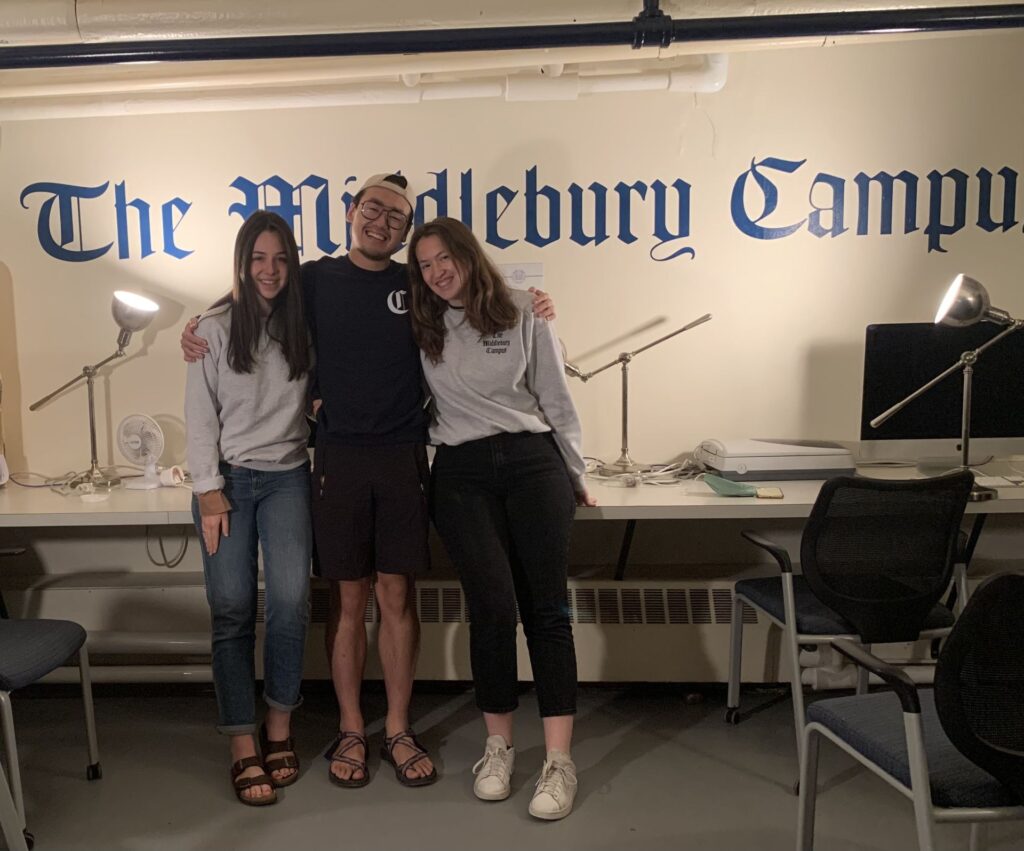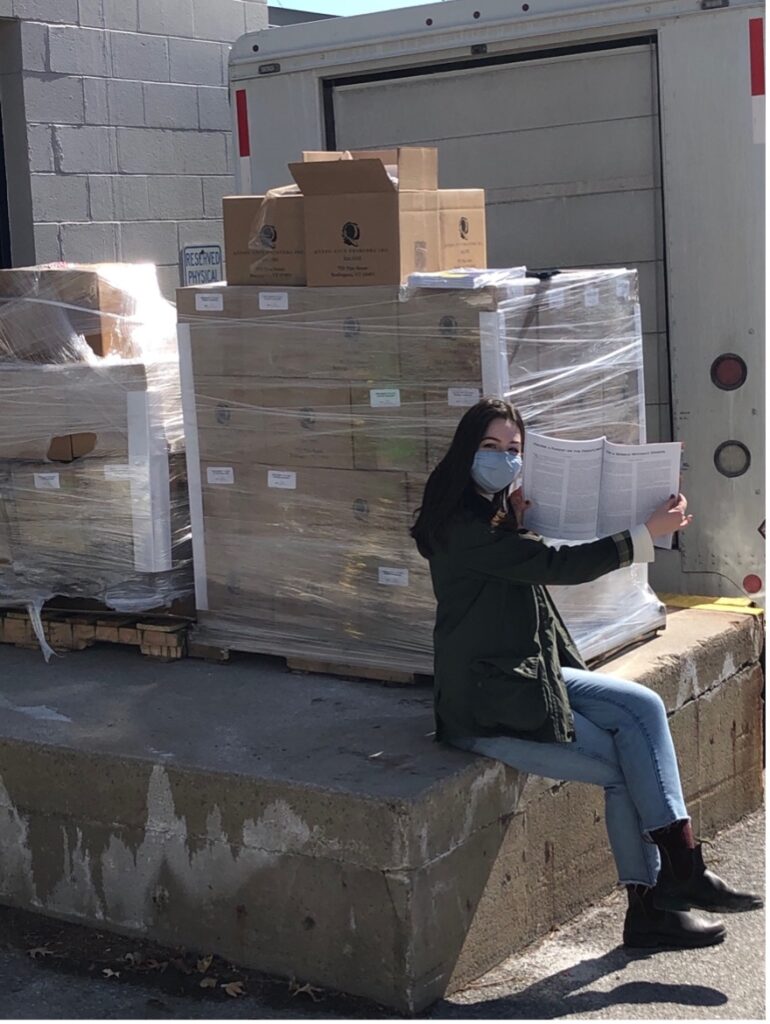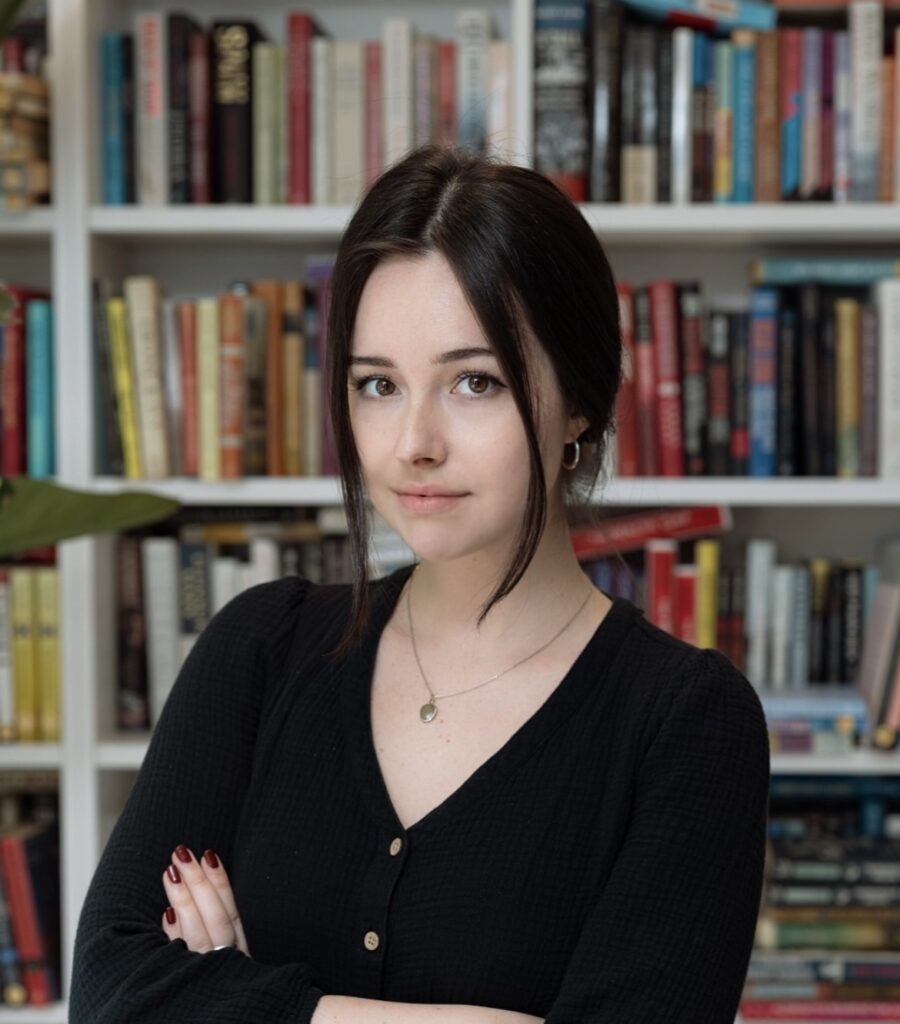Editorial intern Cassie Elish ’25 talks with former NER intern & current editor Hattie LeFavour about breaking into the publishing industry, the everyday demands of being an editor, and her time at Middlebury College.
Cassie Elish: Where are you now, geographically and professionally?
Hattie LeFavour: I live in New York City. I’m an editor on the adult trade team at Bloomsbury US, the American branch of the global independent publisher, and I acquire and edit nonfiction. Reported narratives, cultural histories, criticism, that sort of thing. I care a lot about fiction too, but it’s not my focus right now.
CE: Did you always know you wanted to be a book editor? How did you get your first job at Bloomsbury?
HL: I always wanted to work with writing. My father is a critic and my mother is an author, so the specter of a career in books was always there. I’m much more of a reader than a writer myself, so I used my time at Middlebury to try out as many different editorial positions as I could. New England Review and The Campus (I was the managing editor), but also a job at a New York literary agency, on a Senate campaign, at Bloomsbury as an intern, lots of others. I worked at Bloomsbury during my sophomore summer and remember it feeling like such a natural fit. During my senior J-term, I reached out to one of the editors to ask about entry-level positions and it turned out there was an assistant editor job they needed to fill immediately. I wanted it so badly that I knew I’d do anything to make it work. A few interviews later and I started the job, working twenty-nine hours per week until I graduated and could start full-time. I loved it right away, but I was still managing editor at The Campus and finishing a double-major, so I think I short-circuited a few times trying to keep all the style books straight. It’s so laughable to think of now—a lot of entry-level publishing is mailing things, so I had to have these huge boxes of books delivered to the mail center. I’d schlep them across campus in the snow and stack them in my tiny dorm room in LaForce. I didn’t have a car so I had to convince my friend to drive me to the UPS in town twice a week to mail them out with letters I’d printed in Davis Library. (Thank you, sweet Elizabeth.)
CE: When were you an intern at NER, and what was a highlight of your experience?
HL: It was my senior fall at Middlebury, a semester of remote classes. I remember regretting that I wouldn’t be able to work in the NER office and study its editors like Carolyn, but we all made the best of it. My co-intern was a student named Georgia Vasilopolous who is lovely and very insightful about writing, so I looked forward to talking fiction submissions with her on the phone. To be honest, I think the most valuable things that came from my experience at NER were hearing the editors talk in meetings and reading back issues on my own time. I mean, when I got there, they had just published short fiction by Raven Leilani and Emily Hunt Kivel, poetry by Elisa Gabbert and Maggie Smith—awe-inspiring taste that produced awe-inspiring work.

CE: Did interning at NER help you determine what genres of writing you wanted to work with as an editor?
HL: Actually, working at NER tricked me into thinking I wanted to edit more fiction than I do. NER’s short fiction is top-shelf, and I loved reading their submissions and suggesting edits. I set out in book publishing wanting to edit nonfiction as well as novels—and I did edit a few that I love. But an editor’s job is to find the overlap in the Venn diagram of projects you want to read and projects a critical mass of other people will want to read. For me, I think that overlap is much bigger in nonfiction than in fiction. I understand and find pleasure in bestselling nonfiction in a way that I don’t for commercial novels. For example, I don’t edit (or really read) celebrity memoirs, but I “get” the allure of a splashy New York Times–bestselling tell-all much more than I do for some of the novels that live on the fiction bestseller list. I’m sure I’ll come back to fiction in the future, but right now I have plenty of colleagues with an eye for high-quality fiction that works.
CE: What do you read for pleasure? Have you read anything good lately?
HL: A lot of magazines, a lot of fiction, a lot of nonfiction I wish I’d published. I like rich, ambitious novels, like Clare Sestanovich’s Ask Me Again, Anne Enright’s The Wren, the Wren, Isabella Hammad’s The Parisians, Bloomsbury’s own Aysegul Savas’s The Anthropologists, books like that. I’m also slowly working through Joy Williams’s backlist, and last summer I tried to fill in my gaps on the Oxford American’s “Greatest Southern Novels of All Time” list. In nonfiction I’ve recently read Soldiers and Kings by Jason De Leon, Homeland by Richard Beck, How to Hide an Empire by Daniel Immerwahr, Cue the Sun! by Emily Nussbaum, and The Year the Clock Broke by John Ganz. I also think it’s important for me to be familiar with the most popular narrative nonfiction published before I was an adult, so I’ve been listening to audiobooks of the “greatest hits.” Susan Orleans’s The Orchid Thief, John Berendt’s In the Garden of Good and Evil, Bill Buford’s Heat, books by master nonfiction writers whose work captured readers and endured.
CE: Do you find it hard to read for pleasure when reading is your job?
HL: Hard in the sense that I’ve had to get glasses for the first time in my life because of the eye strain, yes. Otherwise reading for pleasure is a part of the job. It’s hard to be an effective editor if you don’t read widely, and a big chunk of my pleasure reading is prep work for books I’m going to be editing anyway. I usually receive and edit a full manuscript a year or two after I acquire the project for Bloomsbury, so I have some built-in time to learn as much about the subject (and the market for the subject) as I can. I just started editing a great book about obituaries from a longtime New York Times obituarist, so for the past few months I’ve been reading a lot of writing about writing about death. Edwidge Danticat’s The Art of Death, Marilyn Johnson’s The Dead Beat, Robert McG Thomas’s collection 52 McGs, collections of Daily Telegraph obituaries edited by the legendary Hugh Massingberd, a few American journalists’ memoirs. Obituaries are so misunderstood—they’re some of the liveliest forms of writing out there, if they’re any good—so it’s been a huge pleasure. To your question, though, I think everyone gets word burnout at some point. If you ask a publishing employee which books they’re bringing to read on vacation, half the time the answer is a gleeful “none at all.”

CE: What’s one piece of advice you would give to aspiring publishing professionals?
HL: You need to read your Hawthorne, Cooper, Coleridge—all that. Gather ye canon while ye may. Just understand that the publishing industry is focused pretty squarely on contemporary literature. If you’re looking to work in trade publishing, you need to know your way around the landscape as it is right now. You need to follow living writers, read living critics, understand the books and authors and traditions they’re in conversation with. If you’re applying for a publishing job involving literary fiction, every person who gets as far as an interview will have read Austen. But who will have read Tokarzuk, Erpenbeck, Kushner, Lerner, DeWitt? And which is more useful if you’re tasked with figuring out how to pitch a debut literary novel coming out in 2026?
The same principle holds in every kind of publishing. As long as there are readers who love it, there are editors and publicists and marketers who get paid to make it—high literary fiction or celebrity memoirs, critical essays or “dark academia” romance, cookbooks or pop-science nonfiction, investigative reporting or children’s books. If you read rigorously and with intention, the rest of the job is learnable.
CE: Is there anything else you would like to share?
HL: I run the Bloomsbury Adult Trade Editorial internship program and love talking to Middlebury undergrads. Please apply!
